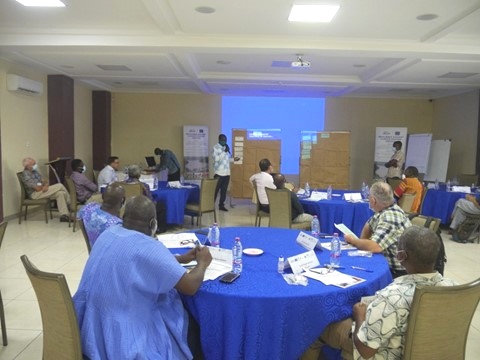Stakeholders in Conservation Agriculture (CA) held discussions at a two-day summit in Accra, to develop a consolidated Manual for CA in Ghana. The engagement, funded by the European Union’s Resilience Against Climate Change (REACH) Project, aimed to review the myriad of existing CA manuals in Ghana to develop a standardized one that serves as a one-stop reference document for stakeholders.
Conservation Agriculture is a sustainable approach to agricultural production which aims to protect soil from erosion and degradation, improve its quality and biodiversity, and contribute to the preservation of natural resources, water, and air, whilst improving yields. CA is based on three core principles: minimum soil disturbance, maintenance of permanent soil cover, and use of crop rotations with a diversity of crop species.
The development of a consolidated CA manual is in line with component 2 of the REACH Project implemented by GIZ, which among other things would seek to ensure climate-smart livelihoods by promoting CA at the institutional, communal, and individual level.
The manual will then form the basis for the design of a curriculum for training agricultural extension workers at the Damongo Agricultural College. Such a course is foreseen to be replicated in other educational and training institutions in the country. This would strengthen the extension services for farmer training in conservation agriculture in the face of a changing and variable climate, particularly in the Northwest.
The CA discussion summit brought together stakeholders from Government Institutions, Development Partners, Non-Governmental Organizations, Research Institutions, and Academia to build consensus on the concept, structure, content, and chapters of the manual. This follows the formulation of a draft concept and chapters after collecting data on already existing manuals and documents on Conservation Agriculture.
In a welcoming speech, the Team Leader for the Project, Florian Winckler stated that “the EU-REACH project is happy to contribute to government’s efforts aimed at developing the agricultural sector especially in light of the looming climate change issues. The development of the consolidated CA manual for Ghana will be beneficial to all stakeholders, especially in the agricultural sector”.
“The REACH Project takes a keen interest in the improvement of the livelihoods of the rural people who largely depend on agriculture and most importantly through climate-smart practices…” Mr. Winckler added.
Story by: Quainoo Reuben.








